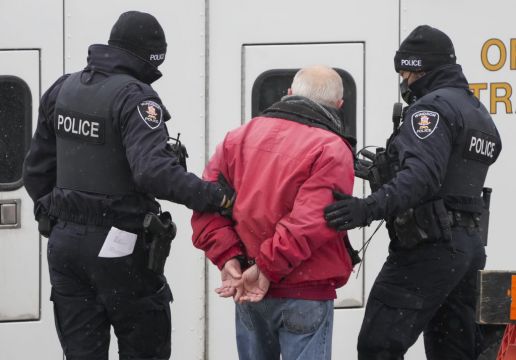The busiest US-Canada border crossing has reopened after protests against Covid-19 restrictions closed it for almost a week.
The Sunday night reopening of the Ambassador Bridge between Windsor, Ontario and Detroit, Michigan came as Canadian officials held back from a crackdown on a larger protest in the capital, Ottawa.
The Detroit International Bridge company said “the Ambassador Bridge is now fully open allowing the free flow of commerce between the Canada and US economies once again”.
The crossing normally carries 25% of all trade between the two countries, and the blockade on the Canadian side had disrupted business on both sides, with car makers forced to shut down several factories.

Police in Windsor said earlier in the day that more than two dozen people had been peacefully arrested, seven vehicles towed and five seized as officers cleared the last demonstrators from near the bridge, which links the city – and numerous Canadian car factories – with Detroit.
The protest in Ottawa, meanwhile, has paralysed the city centre, infuriating residents who are fed up with police inaction and increasing the pressure on prime minister Justin Trudeau, who presided at a Cabinet meeting late on Sunday.
A senior government official said Mr Trudeau planned to meet virtually with the leaders of Canada’s provinces on Monday morning.
Today, I convened another Incident Response Group meeting. We covered further actions the government can take to help end the blockades and occupations. We’ll keep working urgently on this – to protect jobs, public safety, our neighbourhoods, and our economy.
— Justin Trudeau (@JustinTrudeau) February 14, 2022
The demonstrations have reverberated across Canada and beyond, with similar convoys in France, New Zealand and the Netherlands.
The US department of homeland security warned that truck convoys may be in the works in the United States.
The Ambassador Bridge had remained closed for most of the day despite the break-up of the protest as a heavy snowstorm blanketed the area.
Windsor mayor Drew Dilkens had said the span would open once authorities determined it was safe to do so.
Canada’s industry minister, Francois-Philippe Champagne, welcomed the development, saying on Twitter: “Good news. Glad to see that the Ambassador Bridge is now reopened.”

US president Joe Biden’s administration acknowledged the seemingly peaceful resolution to the demonstration, which it said had “widespread damaging impacts” on the “lives and livelihoods of people” on both sides of the border.
“We stand ready to support our Canadian partners wherever useful in order to ensure the restoration of the normal free flow of commerce can resume,” homeland security adviser Dr Liz Sherwood-Randall said in a statement.
In Ottawa, which is about 500 miles north-east of Windsor, mayor Jim Watson said the city struck a deal with protesters who have been in city centre streets for more than two weeks that will see them move out of residential areas in the next 24 hours.

Mr Watson said he agreed to meet with demonstrators if they confined their protest to an area around Parliament Hill and moved their trucks and other vehicles out of residential areas by noon on Monday.
The mayor shared a letter from one of the protest’s organisers, Tamara Lich, in which she said demonstrators “agree with your request” to focus activities at Parliament Hill.
But Ms Lich later denied there was an agreement, saying in a tweet: “No deal has been made. End the mandates, end the passports. That is why we are here.”
Mr Watson added in his letter to protesters that residents are “exhausted” and “on edge” due to the demonstrations and warns that some businesses are teetering on the brink of permanent closure because of the disruptions.

The ranks of protesters had swelled to what police said were 4,000 demonstrators by Saturday, and a counter-protest of frustrated Ottawa residents attempting to block the convoy of trucks from entering the city centre emerged on Sunday.
Mr Trudeau has so far rejected calls to use the military, but had said that “all options are on the table” to end the protests.
The prime minister has called the protesters a “fringe” of Canadian society.
While the protesters are decrying vaccine mandates for truckers and other Covid-19 restrictions, many of Canada’s public health measures, such as mask rules and vaccine passports for getting into restaurants and theatres, are already falling away as the Omicron surge levels off.

About 90% of truckers in Canada are vaccinated, and trucker associations and many drivers have denounced the protests.
The US has the same vaccination rule for truckers crossing the border, so it would make little difference if Mr Trudeau lifted the restriction.
Pandemic restrictions have been far stricter there than in the US, but Canadians have largely supported them. The vast majority of Canadians are vaccinated, and the Covid-19 death rate is one-third that of the United States.
Mr Biden, in an interview with NBC, struck a critical tone when asked about those likely to object to the mask mandate at the Super Bowl.
“I love how people talk about personal freedom,” he said.
“If you’re exercising personal freedom, but you put someone else in jeopardy, their health in jeopardy, I don’t consider that being very good with freedom.”







